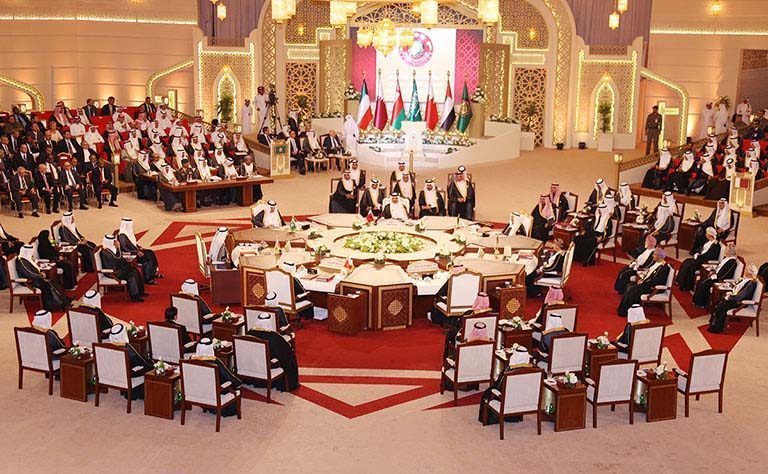While the blockade has been lifted and all of the former blockading countries have signed on to the Al Ula declaration, tensions remain between Doha and Abu Dhabi, writes Dr Andreas Krieg.
When the United Arab Emirates (UAE), Saudi Arabia, Bahrain and Egypt announced in the early hours of 5 June 2017 that they would close their land, air and sea borders to Qatar, locals as well as international observers were caught by surprise.
In reality, however, the root causes of the Gulf crisis had been unravelling for years – not least since the beginning of the Arab Spring. And although the blockading countries quickly resorted to weaponised narratives about ‘terrorism’, at the heart of the crisis was an ideational and ontological rift over visions for the future of the Arab world.
This ideational and ontological divide was not overcome by simply signing a piece of paper in Al Ula. Much more, while Saudi Arabia and Qatar have shown a great degree of pragmatism in managing their differences post-Al Ula, it remains the ideological confrontation between Doha and Abu Dhabi that appears unmanageable.
Four years on, it was Saudi Arabia that broke rank with the other blockading countries to accept Qatar’s continuous willingness to overcome the blockade.
https://twitter.com/dohanews/status/1371114049484771332
Realising that the costs of keeping the entirely superfluous crisis going had long outweighed the benefits, Saudi Arabia was eager to seize the opportunity to buy credit with the incoming Biden administration.
The ‘Wild West’ years of the Trump era where regional actors would get a blank check to live out their wildest phantasies without any consequences were over. Riyadh had to accept in late 2020 that its war over narratives with its much smaller neighbour Qatar had failed to mobilise political support in Washington.
On the contrary, on both sides of the political aisle American policymakers had lost patience with a redundant conflict that pitted US security partners against one another.
From the onset, mediators in Washington had focused on Saudi Arabia to generate an opening for dialogue between the self-proclaimed ‘anti-terror quartet’ and the Qataris, knowing that for the kingdom despite objections to Al Jazeera and Qatar’s Iran policy, grievances were not as deep-seated as they were in Abu Dhabi.
“The ideological rift between Abu Dhabi and Doha is far more than an issue-based conflict where compromises could be found.”
Like Qatar, the small federation of sheikhdoms had emerged from Saudi’s shadow over the past decade as an actor in its own right. Like Qatar, the UAE were offering an alternative vision to Saudi Arabia’s increasingly flawed socio-political model. Like Qatar, the UAE had emerged as a protagonist during the Arab Spring – however not as a revolutionary but a counter-revolutionary driving force.
And this is where Abu Dhabi’s grievances with Qatar continue.
While Qatar has positioned itself as an advocate for socio-political liberalisation and pluralism as a means to achieve stability in a conflict-ridden region, the UAE since 2013 has become the patron of a regional policy of authoritarian stability.
While Qatar supported the revolutions a decade ago to fight authoritarianism, the UAE has become the region’s great counterrevolutionary force eager to restore authoritarian power in the region as a means to contain what Abu Dhabi views a fundamental threat to regime security: the mobilisation of civil-society.
The images of hundreds of thousands of protesters taking to the streets, creating uncontrollable waves of public mobilisation washing away decade-old regimes, created paranoia in Abu Dhabi that went far beyond political Islam.
Qatar was and is still seen in Abu Dhabi as the principal sponsor of that socio-political mobilisation in the region that in the eyes of the Al Nahyan has brought about regional instability through revolution, insurgency, terrorism and failed states.
For the UAE the antidote to civil-societal mobilisation remains the iron fist of an authoritarian leader – such as the likes of Abdel Fattah el-Sisi in Egypt, Khalifa Haftar in Libya and Bashar al-Assad in Syria who all benefit from Emirati support.
Thus, while the blockade has been lifted and all of the former blockading countries have signed on to the Al Ula declaration, the ideological rift between Abu Dhabi and Doha is far more than an issue-based conflict where compromises could be found.
Especially in the eyes of the UAE’s de facto leader Mohammad bin Zayed (MbZ) the growth of the UAE’s role in the region over the past decade has to come at the expense of Qatar’s influence. The zero-sum mentality that the Emirates have also brought to conflicts in Libya, Yemen and the Horn of Africa make it difficult to find pragmatic ways forward with Qatar.
Even if remaining differences in the Gulf can be ironed out between both parties, the confrontation will be exported elsewhere as the UAE’s expansive disinformation networks continue to attack Qatar.
Although Qatar has been retreating from engagements in Yemen, Syria and Libya since 2014, trolls and bots provide the UAE with deniable means in the information space to attack Qatar’s allegedly subversive role in the region.
Emirati talking points about Al Jazeera, the Muslim Brotherhood and Islamism more widely will continue to shape discourse in the region – sometimes more or less directly also attacking Qatar.
For the time being, however, until the next escalation of tensions, at least the people of the Gulf can return to a degree of normality while the wounds inflicted by this unnecessary crisis might take a generation to heal.
Dr. Andreas Krieg is an assistant professor at the School of Security Studies at King’s College London and researcher of Middle East and North African Studies.
The views and opinions expressed in this article are those of the authors and do not necessarily reflect the official policy or position of Doha News, its editorial board or staff.
Follow Doha News on Twitter, Instagram, Facebook and Youtube







